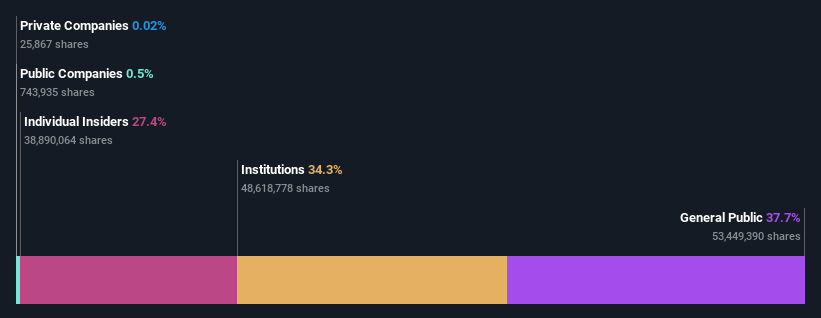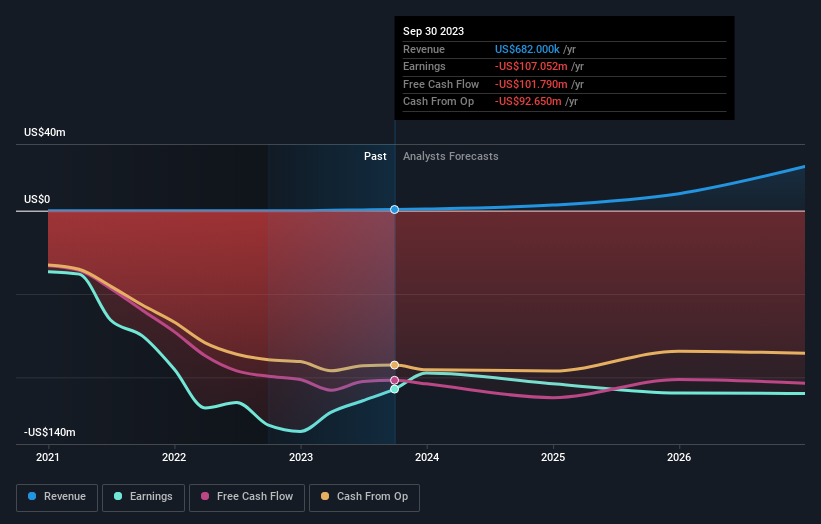- United States
- /
- Life Sciences
- /
- NasdaqGM:QSI
Retail investors who have a significant stake must be disappointed along with institutions after Quantum-Si incorporated's (NASDAQ:QSI) market cap dropped by US$33m

Key Insights
- The considerable ownership by retail investors in Quantum-Si indicates that they collectively have a greater say in management and business strategy
- 52% of the business is held by the top 5 shareholders
- Insider ownership in Quantum-Si is 27%
To get a sense of who is truly in control of Quantum-Si incorporated (NASDAQ:QSI), it is important to understand the ownership structure of the business. We can see that retail investors own the lion's share in the company with 38% ownership. Put another way, the group faces the maximum upside potential (or downside risk).
While the holdings of retail investors took a hit after last week’s 13% price drop, institutions with their 34% holdings also suffered.
Let's take a closer look to see what the different types of shareholders can tell us about Quantum-Si.
Check out our latest analysis for Quantum-Si

What Does The Institutional Ownership Tell Us About Quantum-Si?
Institutions typically measure themselves against a benchmark when reporting to their own investors, so they often become more enthusiastic about a stock once it's included in a major index. We would expect most companies to have some institutions on the register, especially if they are growing.
Quantum-Si already has institutions on the share registry. Indeed, they own a respectable stake in the company. This can indicate that the company has a certain degree of credibility in the investment community. However, it is best to be wary of relying on the supposed validation that comes with institutional investors. They too, get it wrong sometimes. If multiple institutions change their view on a stock at the same time, you could see the share price drop fast. It's therefore worth looking at Quantum-Si's earnings history below. Of course, the future is what really matters.

Hedge funds don't have many shares in Quantum-Si. From our data, we infer that the largest shareholder is Jonathan Rothberg (who also holds the title of Top Key Executive) with 26% of shares outstanding. Its usually considered a good sign when insiders own a significant number of shares in the company, and in this case, we're glad to see a company insider play the role of a key stakeholder. ARK Investment Management LLC is the second largest shareholder owning 11% of common stock, and Nikko Asset Management Co., Ltd. holds about 6.0% of the company stock.
To make our study more interesting, we found that the top 5 shareholders control more than half of the company which implies that this group has considerable sway over the company's decision-making.
While it makes sense to study institutional ownership data for a company, it also makes sense to study analyst sentiments to know which way the wind is blowing. There is a little analyst coverage of the stock, but not much. So there is room for it to gain more coverage.
Insider Ownership Of Quantum-Si
The definition of an insider can differ slightly between different countries, but members of the board of directors always count. Management ultimately answers to the board. However, it is not uncommon for managers to be executive board members, especially if they are a founder or the CEO.
Insider ownership is positive when it signals leadership are thinking like the true owners of the company. However, high insider ownership can also give immense power to a small group within the company. This can be negative in some circumstances.
Our most recent data indicates that insiders own a reasonable proportion of Quantum-Si incorporated. Insiders have a US$59m stake in this US$215m business. We would say this shows alignment with shareholders, but it is worth noting that the company is still quite small; some insiders may have founded the business. You can click here to see if those insiders have been buying or selling.
General Public Ownership
The general public, who are usually individual investors, hold a 38% stake in Quantum-Si. While this size of ownership may not be enough to sway a policy decision in their favour, they can still make a collective impact on company policies.
Next Steps:
While it is well worth considering the different groups that own a company, there are other factors that are even more important. Be aware that Quantum-Si is showing 3 warning signs in our investment analysis , and 1 of those is a bit concerning...
Ultimately the future is most important. You can access this free report on analyst forecasts for the company.
NB: Figures in this article are calculated using data from the last twelve months, which refer to the 12-month period ending on the last date of the month the financial statement is dated. This may not be consistent with full year annual report figures.
Valuation is complex, but we're here to simplify it.
Discover if Quantum-Si might be undervalued or overvalued with our detailed analysis, featuring fair value estimates, potential risks, dividends, insider trades, and its financial condition.
Access Free AnalysisHave feedback on this article? Concerned about the content? Get in touch with us directly. Alternatively, email editorial-team (at) simplywallst.com.
This article by Simply Wall St is general in nature. We provide commentary based on historical data and analyst forecasts only using an unbiased methodology and our articles are not intended to be financial advice. It does not constitute a recommendation to buy or sell any stock, and does not take account of your objectives, or your financial situation. We aim to bring you long-term focused analysis driven by fundamental data. Note that our analysis may not factor in the latest price-sensitive company announcements or qualitative material. Simply Wall St has no position in any stocks mentioned.
About NasdaqGM:QSI
Quantum-Si
A life sciences company, engages in the development of single-molecule detection platform to enable Next Generation Protein Sequencing (NGPS).
Flawless balance sheet low.


